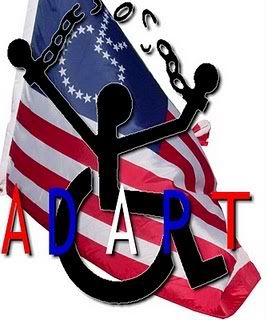Since the time this media advisory went out this morning, nearly 500 members of ADAPT did in fact occupy both the first and second floors of the Georgia Capitol. After several hours of negotiations, the Governor committed to a meeting between ADAPT and the Governor's Chief of Staff. That meeting will take place on Tuesday, October 13 at the Capitol.
Follow ADAPT in Atlanta on Twitter at http://twitter.com/Nationa
and read the ADAPT Daily Report at http://www.adapt.org/freeo
For Immediate Release:
October 12, 2009
MEDIA ADVISORY
For Information Contact:
Bruce Darling 585-370-6690
Marsha Katz 406-544-59504
http://www.adapt.org
ADAPT Visits GA Governor at Home; Demands “Home” for People in Institutions
WHO: 500 members of ADAPT, nation’s largest grassroots disability rights organization
WHAT: Went to Georgia Governor’s Office
WHERE: 206 Washington Street on Capitol Square
WHEN: 9 a.m. Monday, October 12, 2009
WHY: To demand that Gov. Sonny Perdue stop denying civil rights to older and disabled Georgians and start following the law (ADA) and finally comply with the 1999 U.S. Supreme Court decision in Olmstead v. L.C. and E.W. In May of 1999 the Supreme Court found the state of Georgia guilty of segregation and discrimination against Georgians with disabilities because it forced people with disabilities (and older Georgians) into nursing homes, state hospitals and institutions, rather than serving them in the community.
In May of 1999 the Supreme Court found the state of Georgia guilty of segregation and discrimination against Georgians with disabilities because it forced people with disabilities (and older Georgians) into nursing homes, state hospitals and institutions, rather than serving them in the community.
In Governor Perdue’s first term, he acknowledged the state had made little effort to provide community- based services for people with disabilities, and promised to “…make alternatives to institutional care a priority by making Georgia's waiting lists for home and community based services a state funding priority.” He further promised to cut the waiting lists for services and the bureaucratic red tape involved in receiving state services, and to give families and communities a voice in the monitoring of services.
From 2002 to 2007, the percent of nursing facility residents under age 65 grew from 11.6% (7,211 people) to 14.2% (9,273 people). Of the approximately 230,000 non-institutionalized Georgians with disabilities age 5+ who require daily assistance, only about 17% of them get any assistance through the state’s Home and Community-Based Services system. And recently, the state’s Division of Aging has announced that due to budget cuts it is discontinuing its participation in the federal Money Follows the Person (MFP) program, a program created in the Deficit Reduction Act of 2005 that allows people to move from more expensive institutional settings back into more cost effective community settings.
“It’s a shame that ten years after Olmstead, more people are going into nursing homes than ever before,” said Bernard Baker, an organizer with Atlanta ADAPT. “Living in the community isn’t a privilege, it’s a civil right, and we are being denied our civil rights.”
ADAPT Demands that Governor Perdue:
1. Meet with ADAPT;
2. Appoint an Olmstead “Czar” to divert from nursing homes people who wish to remain in the community, and transition others already in nursing facilities back into the community;
3. Adequately fund community-based services so Georgia complies with Olmstead and the ADA;
4. Freeze institutional funding at current levels and work with advocates to rebalance long-term services and supports funding so the majority is spent on home and community services;
5. Modernize Georgia’s Nurse Practice Act to allow trained attendants to perform health maintenance tasks;
6. Fund community organizations to identify & assist people in institutions to return to community;
7. Issue an Executive Order requiring the Division of Aging to keep implementing MFP, and remove the “cost share” from Community Care Services Program services; and
8. Demonstrate leadership by publicly urging other southern state governors to develop and implement Olmstead plans and policies in accordance with the ADA and the Olmstead decision.
[photo courtesy CDRNYS' Facebook album]
It's Beginning to Look A Lot Like Fun*Run Time
It's ALREADY that time of year again: The ADAPT Fun*Run for Disability Rights is April 22nd 2012. Maryland's fundraising goal is $8,000 this year. Yes, that's right, $8,000
Donate $1! Donate $10! Donate $100! Donate $1,000! JUST DONATE so we can FREE OUR PEOPLE! http://adaptfunrun.org/runner.php?id=7 I thank you very much for your support!
Wednesday, October 14, 2009
ADAPT Media Release from Oct 12, 2009
Tags:
ADAPT army,
Atl ACTION 09,
long term care,
media,
Olmstead
Subscribe to:
Post Comments (Atom)

















0 comments:
Post a Comment